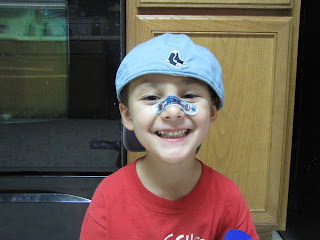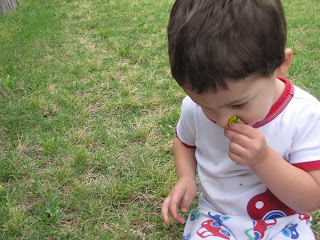A friend and fellow teacher asked me the other day how we have been so successful raising our sons to be bilingual. This friend is from the Dominican Republic and his wife is from Peru and he will readily admit that they have not succeeded in raising bilingual children. Both of their children, who are now in elementary school, understand quite a bit of Spanish but will not speak a word of it. My child, Diego, on the other hand, has as big of a vocabulary and speaks with the fluency of any other native Spanish-speaking child.
This has been no small feat and certainly didn't happen on accident. My first language was English and although my husband learned Spanish first, English took over as he went through the school system in the U.S. My husband's family does speak Spanish but since they do not live close, we have had to rely on ourselves to ensure that the boys learn Spanish.
Now that we are four years into this bilingual journey, I would like to reflect on why we have been successful for myself and hopefully to help anyone else who is going through this difficult but rewarding process. I am going to break this into several posts because I believe that there are several reasons.
#1 Why we have been successful: Diego's first language is Spanish.
There are several different ways to balance multiple languages within a home. The two most popular seem to be OPOL (One Parent, One Language) and ML@H (Minority Language at Home.) OPOL is where one parent speaks, for example, English to the child and the other parent speaks Spanish. With ML@H, as the name implies, the minority language is always spoken within the family and the majority language (English) is learned from the environment.
Our particular method is closest to ML@H but we went a step further to ensure that Diego was surrounded by the Spanish outside of the home also. From the time he was born we always looked for Spanish-speaking babysitters, watch television in Spanish, listened to music in Spanish, and even found a Spanish immersion preschool for him to attend. In a sense, until he was three, he was immersed in Spanish. This, of course, caused some problems. Several family members were not pleased that my son could not speak English. Remember that no one on my side of the family speaks Spanish. And surprisingly, several members of my husband's family voiced their disapproval saying that I would be putting him behind all of the other students when he entered school. I will actually have to write a separate post about how I dealt (and still deal) will the negative reactions from friends and family. I have plenty examples.
I have never had any doubt that Diego would learn to speak English. Living in the United States and dealing day to day with the world outside of our home make it a certainty. Diego's big breakthrough with English came a month after his third birthday when he made friends with a little boy who just moved in down the street. Within a month of playing with this little boy, he was forming complete sentences in English. Now a year later, I would say that while Diego's strongest language is most certainly Spanish, his English is catching up fast. I predict that by the time he is six that he will be more or less equally fluent in both languages.
I have been told by many that our method is too extreme. And I will admit that a few times when Diego was two, I felt terrible when we would go to a playgroup and Diego would not be able to communicate with the other children. It is much easier to write this post looking back now knowing that we are being so successful. It takes a strong stomach and a lot of determination but it has worked for us.





























































